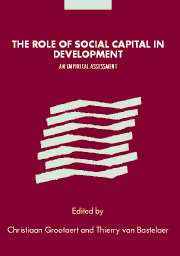Book contents
- Frontmatter
- Contents
- List of figures and maps
- List of tables
- List of boxes
- Notes on contributors
- Acknowledgments
- Foreword by Robert D. Putnam
- Introduction and overview
- Part 1 Social capital at the micro and macro levels: a conceptual discussion and review
- Part 2 The impact of social capital on development
- Part 3 The creation and transformation of social capital
- 7 The impact of development assistance on social capital: evidence from Kenya
- 8 Induced social capital and federations of the rural poor in the Andes
- 9 Social capital and social cohesion: case studies from Cambodia and Rwanda
- 10 Ethnicity, capital formation, and conflict: evidence from Africa
- Conclusion: measuring impact and drawing policy implications
- Index
- References
7 - The impact of development assistance on social capital: evidence from Kenya
Published online by Cambridge University Press: 22 September 2009
- Frontmatter
- Contents
- List of figures and maps
- List of tables
- List of boxes
- Notes on contributors
- Acknowledgments
- Foreword by Robert D. Putnam
- Introduction and overview
- Part 1 Social capital at the micro and macro levels: a conceptual discussion and review
- Part 2 The impact of social capital on development
- Part 3 The creation and transformation of social capital
- 7 The impact of development assistance on social capital: evidence from Kenya
- 8 Induced social capital and federations of the rural poor in the Andes
- 9 Social capital and social cohesion: case studies from Cambodia and Rwanda
- 10 Ethnicity, capital formation, and conflict: evidence from Africa
- Conclusion: measuring impact and drawing policy implications
- Index
- References
Summary
A large body of literature suggests that social capital is important for development (see Coleman 1990; Putnam 1993; Woolcock 1998, among others). Perhaps in response, many donors are actively trying to support the development of civil society and social capital in developing countries. Donors are funding local NGOs, structuring development projects in ways that allow for participation, and providing organizational training for community groups and NGOs. Yet the effectiveness of these efforts to build social capital is largely unknown.
While considerable effort has gone into elucidating the effects of social capital, the determinants of social capital are less well understood. Is social capital determined exclusively by long-run historical, cultural, and economic forces? Or can it be influenced in the short run by policy? If so, how? One reading of Putnam's work on Italy (1993) is that social capital is the result of long-term institutional development and may be very difficult to produce. Other literature suggests that organizational social capital can be eroded by economic restructuring (Heying 1997; Schulman and Anderson 1998) and may also be created in a relatively short period through either national organizations (Minkoff 1997) or community organizing in face-to-face interactions (Wood 1997).
One problem plaguing many studies of social capital is the difficulty of inferring causation from correlation in retrospective data.
- Type
- Chapter
- Information
- The Role of Social Capital in DevelopmentAn Empirical Assessment, pp. 213 - 233Publisher: Cambridge University PressPrint publication year: 2002
References
- 13
- Cited by



